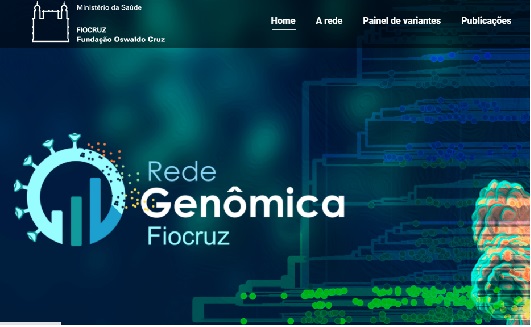Omicron variant accounts for more than 95% of the genomes sequenced in Brazil
08/02/2022
Ricardo Valverde (Fiocruz News Agency)
The Fiocruz Genomic Network has released new data on the status of lineages and variants of the Sars-CoV-2 in Brazil, based on the genomic surveillance produced by the Network and by other initiatives. According to the publication, while in December 39.4% of sequenced genomes belonged to the Omicron variant, in January 2022 this rate rose to 95.9%. The variant has now been found in all of the country’s regions. The Network Report shows that omicron now fully dominates the epidemiological scenario of Covid-19 in Brazil. It also highlights technological innovations developed by the Fiocruz Genomic Network.
In the two weeks (between January 14 and 27) addressed by the data made public by the Network, the Laboratory of Measles and Respiratory Viruses of the Oswaldo Cruz Institute (IOC/Fiocruz) and units of the Foundation in six states (Amazonas, Ceará, Pernambuco, Paraná, Bahia, and Minas Gerais) produced 3,739 genomes. Each one of the Fiocruz sequencing units (in addition to the ones mentioned above, there is another one in the state of Piauí) covers one or more Brazilian states.
Researchers of the Fiocruz Genomic Network remind us that this entire surveillance and monitoring are only possible thanks to the partnership and collaboration of the Public Health State Laboratories (LACENs) and the General Coordination of Laboratories of the Ministry of Health. The GISAID genome deposit platform (WHO) also contributes greatly to make sure these data are entered in real-time.
The samples used by the Fiocruz Genomic Network as support to the national surveillance of respiratory viruses are based on two fundamental pillars. One is a representative sampling of positive cases of Sars-CoV-2 through RT-PCR made in each Brazilian state. The other consists of samples from unusual events identified by local surveillance. There are currently more than one thousand defined lineages of the Sars-CoV-2, but only five have been identified as variants of concern, with significant impact on public health due to characteristics such as greater ability to transmit itself and to infect, higher probability of escaping from antibodies, or a combination of these.
The first omicron genomes in Brazil come from samples from late November. By late December it was already the most common variant in the South-East, North-East, and Southern regions. At the moment, omicron is classified into four lineages (BA.1, BA.1.1, BA.2, and BA.3). In Brazil, up to the moment the latest Fiocruz Genomic Network Report was wrapped up, lineages BA.1 (2,382 genomes), BA.1.1 (226 genomes) and BA.2 (1 genome) have been identified.
ViralFlow
The Report informs that the Fiocruz Genomic Network has developed a platform called ViralFlow, with the goal of changing the backdrop in which research groups work in a decentralized manner, using different tools to obtain and analyze the sequences. Work based on dispersed tools is time-consuming and demands that professionals invest in training to use the various services.
In addition, in cases in which a single patient is infected by two or more variants, separating and assembling the different genomes is not possible using these tools. Developed by Fiocruz Pernambuco, ViralFlow automates many important processes for genomic surveillance and offers a platform for researchers to study multiple aspects of samples of Sars-CoV-2 in a centralized, agile manner.
Helper
Another innovation that intends to improve the work of the Fiocruz Genomic Network is the Helper system, successfully employed in diagnostic essays and inference tests to detect variants. The tool provides higher efficiency in multiple checkings of results and in the sign-up and result release time (approximately four hours of an analyst per each batch of results generated).
The implementation process is led by Fiocruz Ceará. The use of this tool will make it possible to decentralize the process in many laboratories, including the LACENs, and to carry out laboratory surveillance drills, in particular inference essays for variants of the Sars-CoV-2.
Inference tests
On the Fiocruz Genomic Network website, the inference RT-PCR data for variants performed by the LACENs were included. 3,984 tests have been carried out in 16 states (Acre, Amazonas, Amapá, Roraima, Bahia, Ceará, Pará, Rio de Janeiro, Paraíba, Santa Catarina, Rio Grande do Norte, Rondônia, Rio Grande do Sul, Sergipe, São Paulo, and Tocantins), between November 2021 and January 2022. One of the essays to carry out these tests to detect the Sars-CoV-2 and identify its variants was developed by the Laboratory of Diagnostic Technology of the Immunobiological Technology Institute (Bio-Manguinhos/Fiocruz), in a partnership with the Laboratory of Measles and Respiratory Viruses of the IOC/Fiocruz.



